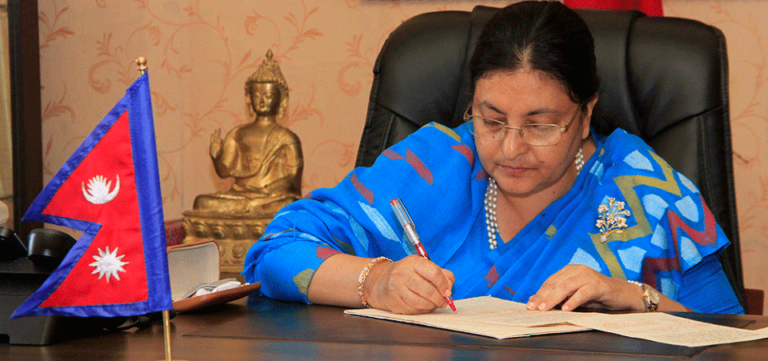
Five writ petitions have been filed at the Supreme Court against President Bidhya Devi Bhandari’s decision to refuse to sign the bill passed by the House of Representatives (HoR) for the second time.
Advocates Sunil Ranjan Singh, Sunil Kumar Yadav and Sagar Baral are among the petitioners who have filed petitions at the Supreme Court demanding a directive to obligate the President to authenticate the bill.
As per the spokesperson for Supreme Court, Bimal Paudel, the first hearing in the case will be held today.
President Bhandari, who had sent the bill to the House of Representatives for reconsideration on August 14, refused to sign it after the Parliament passed the bill as it is and resent it to her for her approval.
In accordance with Article 111 (3) of the constitution, the president can use suspension veto sending the bill to the House of origin with her objection, but Article 113 (4) requires the president to authenticate any bill sent for a second time after being passed by both Houses of Parliament with or without any changes.
Meaning, the Constitution of Nepal does not equip the President with freedom to send back the bill passed by the HoR for a second time.
The petitioners have argued that her actions were a violation of the constitution. They said the constitution stipulated that the president should abide by and protect the constitution, but in her case, it is the president herself who did not abide by and protect the constitution.
The petitioners have urged the court to invalidate her decision not to authenticate the citizenship bill while requesting to list the case for priority and continuous hearing.
They said the president’s action deprived hundreds of thousands of eligible citizens of their right to obtain citizenship and was a violation of the rule of law. The 15-day constitutional deadline for the presidential assent to the bill ended on Tuesday midnight.
President Bhandari’s advisers stated the president, being the protector of the constitution, had the obligation to ensure that the constitutional provisions were not violated in the bill.
They stated that the citizenship bill did not respect some of the constitutional provisions, including the right to live with dignity and the right to privacy, particularly that of single mothers.
They said the bill did not ensure provincial identity on the citizenship card nor did it respect women’s right to lineage without any gender discrimination.
The government informed that the president’s concerns will be addressed in the citizenship regulations to be framed later.





